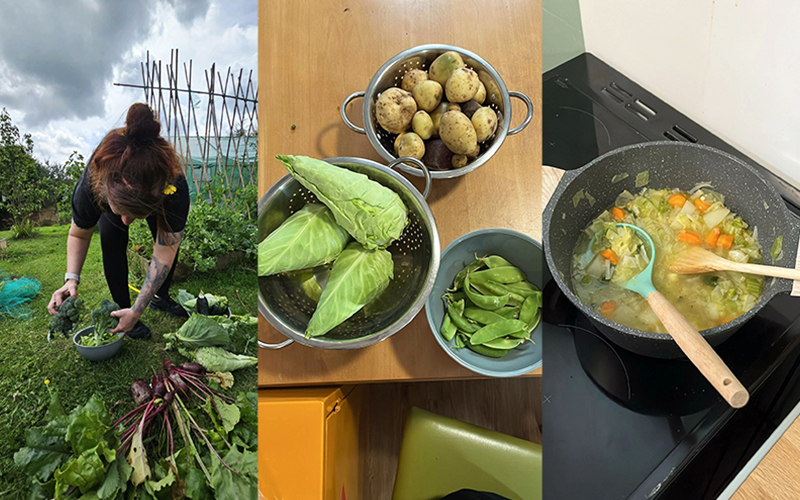
Under the guidance of Occupational Therapists and the Recovery Education team, service users at the 33-bed mental health hospital for women have been actively participating in two innovative programmes; “Field to Fork” and “Clay to Confidence”.
During Recovery Education sessions, service users have learnt the principles of growing their own fruit and vegetables, embracing the concept of self-sustainability. With access to an allotment that provides fresh, home-grown ingredients, service users have been able to create nutritious meals, such as delicious vegetable soup.
Zoe Collins, Recovery College Lead, explained: “At Cygnet Hospital Godden Green, the collaboration between Occupational Therapy and Recovery Education has been instrumental in helping our service users develop a wide range of skills.
“This week marked a significant milestone with their first harvest—a moment that was definitely worth celebrating. What better way to enjoy the fruits of their labour than in our weekly shop and cook sessions.
“These activities not only promote physical and mental well-being but also allow service users to develop essential skills.”
Zoe said the benefits of the ‘Field to Fork’ programme are extensive with the gardening and horticulture element helping service users learn how to plant, nurture, and harvest crops which fosters a connection with nature and provides a sense of accomplishment.
It also gives them nutritional knowledge in terms of understanding the benefits of fresh, organic produce and incorporating it into daily meals promotes healthier eating habits.
Zoe explained: “Preparing meals from scratch enhances culinary abilities, encouraging creativity and independence in the kitchen. There’s also the teamwork and collaboration element whereby working together in both the garden and the kitchen strengthens social bonds and improves communication skills.
“Planning and executing a garden-to-table process teaches valuable time management and organisational skills and we have also found it helps with problem solving skills. Overcoming challenges in gardening and cooking builds resilience and critical thinking.
“Importantly too, engaging in gardening and cooking activities provides therapeutic benefits, reducing stress and enhancing mindfulness.
“We’re proud of our service users’ achievements and look forward to many more successful harvests and delicious meals.”

Earlier this month, the team also took some service users to a local pottery shop for what Zoe described as “an incredibly enriching experience”. They not only created their own unique pieces but also learnt about the entire pottery-making process—from shaping the clay to understanding how it transforms during firing.
They explored the firing process, where the clay is exposed to intense heat in the kiln, hardening into a durable, beautiful piece of art.
Zoe added: “This transformation is a powerful metaphor for personal growth—how, with the right care, patience, and challenges, something soft and malleable can become strong and enduring.
“What made the day even more special was seeing our service users explore and develop a new hobby they can continue once discharged.
“Engaging in activities like pottery can be incredibly therapeutic, offering a creative outlet that supports recovery and well-being. It’s exciting to think that the experience might spark a lifelong passion that helps them on their journey to sustained wellness.”